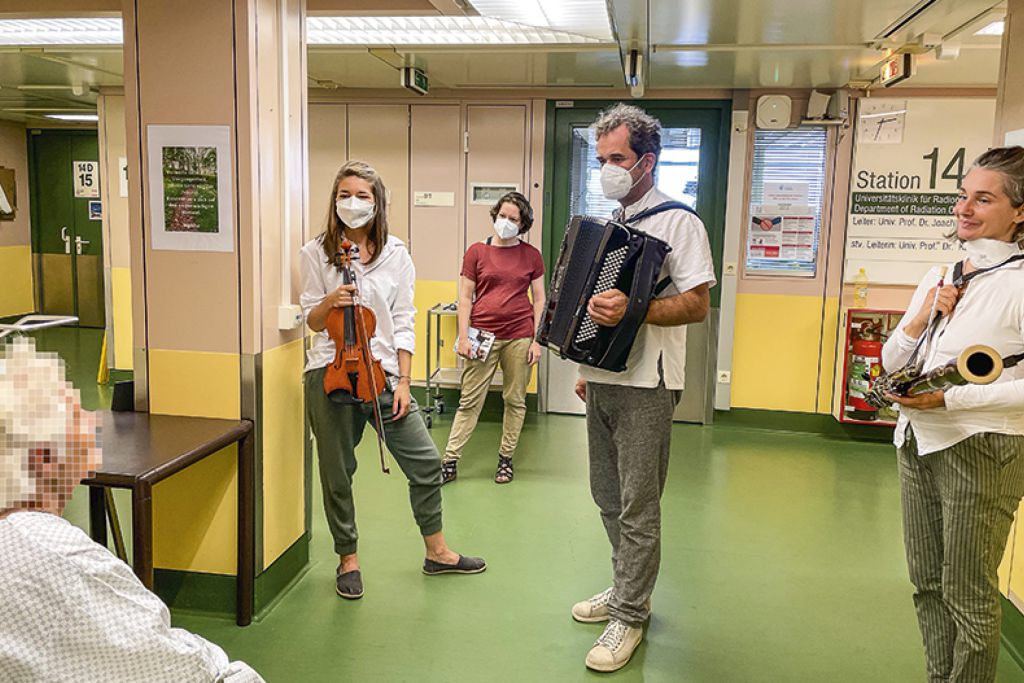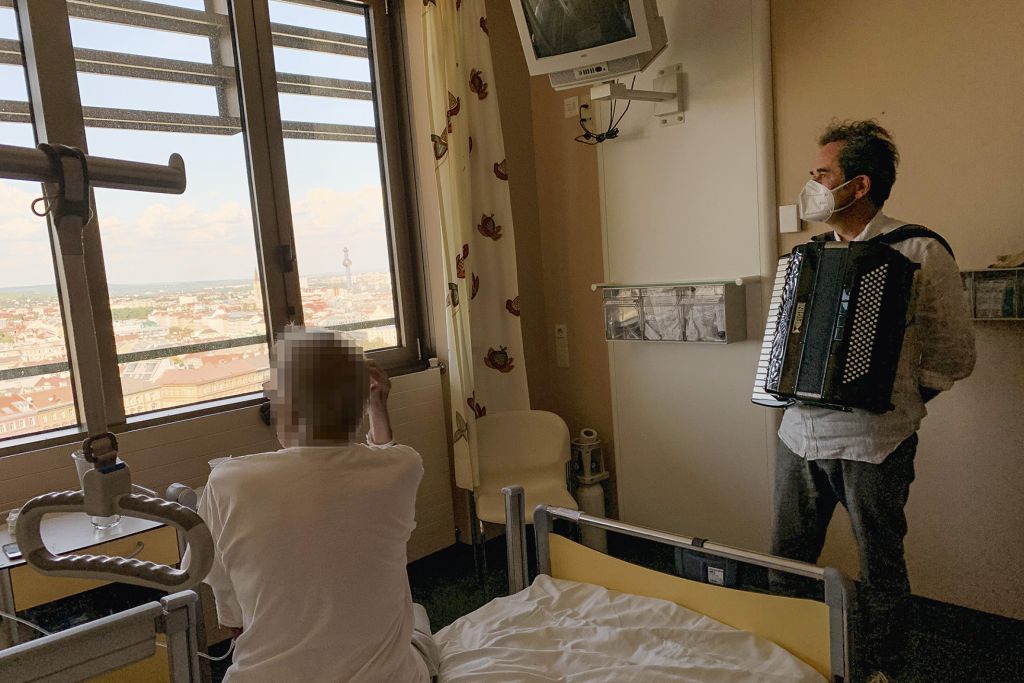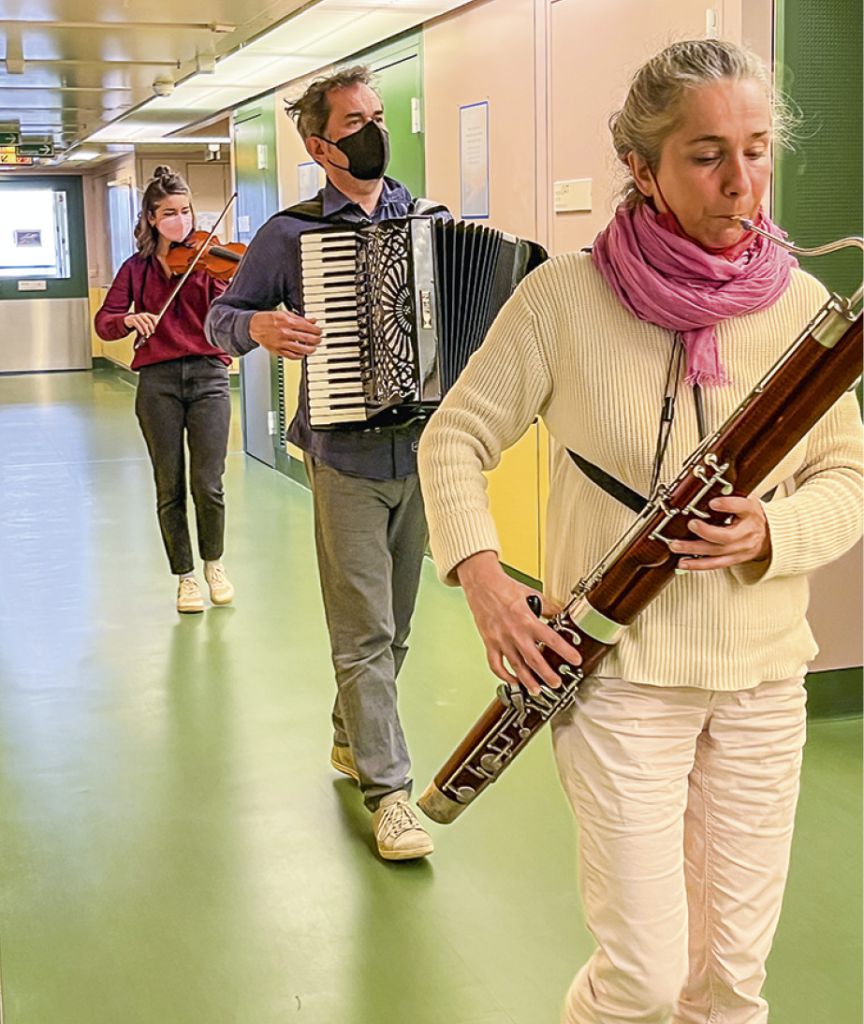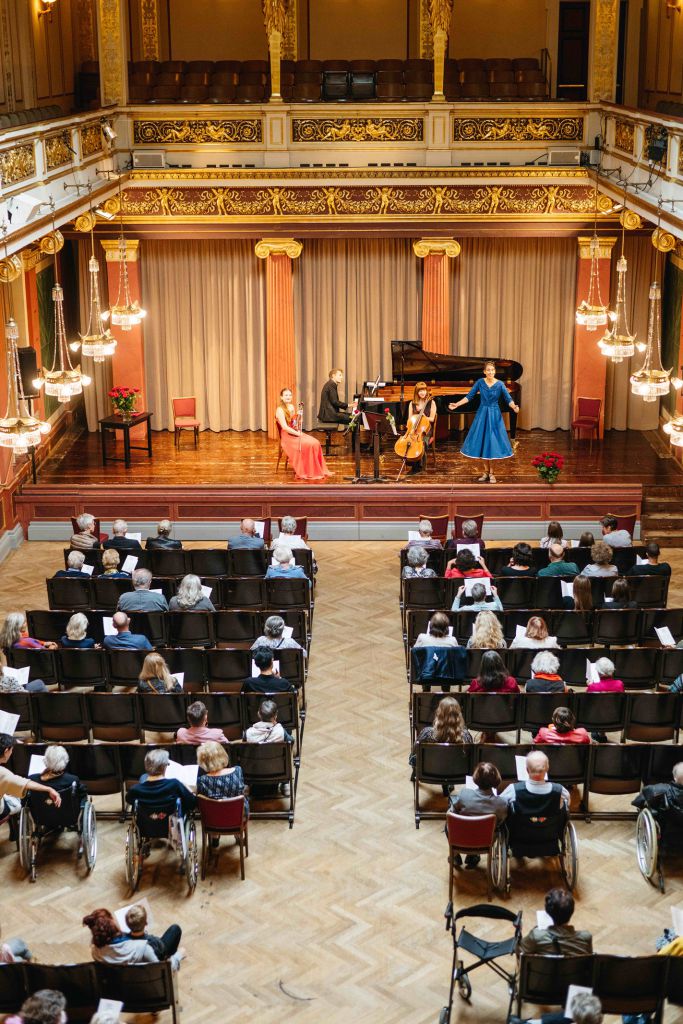Boosts to well-being, distraction from illness and worry, prevention of burnout, reduced levels of stress: music is known to have all kinds of effects where health is concerned. The mdw, through its faculty and students, is involved in a diverse range of music projects and research efforts in the healthcare field. In the following, mdw Magazine sheds light on three of these projects where music’s health-promoting effects are especially evident and experiencing music together creates and reinforces the emotional links between participants.

The international research project ProMiMiC (Professional Excellence in Meaningful Music in Healthcare) revolves around person-centred music in hospital settings at multiple European locations. Its predecessor, MiMiC (Meaningful Music in Healthcare), was conducted in Groningen from 2015 to 2017—and among other things, this project’s findings revealed that person-centred music enhances patient well-being and opens up opportunities for further professional development for both hospital personnel and participating musicians. ProMiMiC, as the follow-up project, examines various aspects of interprofessional learning in greater depth at the respective project locations of Vienna, Groningen, The Hague, and London. In Vienna, the focus has been on how music therapists and musicians learn from one another.
“Person-centred music entails involving patients and hospital personnel in the music’s creation. In response to spontaneously expressed moods, the musicians improvise music or create custom arrangements of existing pieces. For both patients and the involved personnel, this amounts to a highly personal gift—and the musicians learn a lot through this interaction that benefits their artistic practice,” explains Magdalena Bork, an mdw-based member of the ProMiMiC research team. In Vienna, the music sessions held so far have taken place at Vienna General Hospital’s radiation oncology clinic on multiple consecutive days. The participating ensemble, consisting of two instrumentalists and one music therapist, was accompanied by Magdalena Bork for purposes of scientific documentation as well as by project coordinator Laura Bezold, who was responsible for things including establishing contact with the hospital audience. Initially, some patients and hospital staff members were quite sceptical. Due to their illnesses, patients often don’t feel presentable enough to receive visits from strangers. And the personnel, for their part, worry about the disruption of their routines. However, these misgivings were soon put to rest. “By interacting with the musicians, the personnel experience their patients in a new light. And our musical offerings—which we deliberately don’t characterise as music therapy—inject a bit of lightness into a hospital ward’s everyday life and shift topics like pain, medications, organisational difficulties, and death out of view for a brief time,” says Thomas Stegemann, head of the Department of Music Therapy.
While the ensemble does draw on familiar repertoire, this project’s core musical material consists of improvisations based on moods, ideas, and impressions provided by the hospital audience. This approach worked even during the COVID-19 lockdowns, during which hospitals were subject to strict rules. Laura Bezold visited the clinic’s patients with a tablet and loudspeakers, with the musicians being streamed live from a space at the mdw. Even with these technical barriers, it was still possible to make person-centred music happen—and during a period where there were no or very few musical offerings, it met with special appreciation. The success experienced by this project in its hybrid form highlighted ideas for future efforts. “This technological option can allow musical projects to reach patients in wards where the handling of hygiene and access are always subject to very strict rules,” says Laura Bezold.

The learning effects enjoyed by the musicians are considerable thanks to the unusual concert setting, which provides an up close and personal experience of just what emotions their music can evoke. This also challenges musicians to question their usual patterns of thought: “In this type of musical practice, displays of proficiency and perfection aren’t central. Instead, musicians learn to let all that take a back seat, giving themselves over entirely to the moment and the individual needs of their audiences,” explains Bork. Within such a team, the perspectives of its respective members are quite instructive: the music therapist learns how the instrumentalists prepare the performance together and present themselves to an audience with their instruments—things that aren’t typical components of a music therapy session. And the musicians, for their part, are schooled by the therapist in how to interact mindfully with patients and personnel as well as how to moderate such sessions.
At the mdw, students can participate in ProMiMiC for elective credit. The central aim here is to create an attractive setting that enables students to learn and eventually go on to develop a field of activity for musicians in the healthcare sector. “Keen social instincts along with the necessary measures of openness and curiosity are essential in this area of work. And students can train these things just as well as they can train musical excellence,” Bork emphasises. Felix Vermeirsch, an mdw student who studies cello (performance) and has been a student-participant in ProMiMiC sessions, comments: “In today’s music scene, I’ve often noticed that little thought is given to how audiences experience the music. But in ProMiMiC, communicating with and perceiving the audience is crucial—so I’ve learned an enormous amount about how to bridge the gap between musicians and listeners or patients, and that will hugely enrich my future professional life.”

Just how enriching such projects with live music can be for the personnel in hospitals and nursing wards was researched by Krista de Wit in her dissertation. “The musicians also play for the personnel, helping them to just be in the moment for a brief time. This provides them with some mental relief in their extremely hectic everyday working lives and can ultimately play a role in preventing burnout,” says de Wit (see interview).
Being in the moment is also a central point in the Musikverein’s new concert series Souvenir – Konzerte für Menschen mit und ohne Demenz […Concerts for People with and without Dementia]: on six dates in the current season, two piano trios from the mdw are performing in the Musikverein’s Brahms Saal. These concerts are moderated by mdw faculty member Veronika Mandl, who already has experience interacting with people affected by dementia from her work as a Cliniclown. Every concert date has its own motto, and the pieces to be performed are selected to match. The aim here is to stimulate moods, memories, and emotions among the audience members with dementia. “Love, for instance, is a huge theme among older people—be it memories of youthful love or love for their own children. Music stimulates multiple regions of the brain simultaneously, which makes it possible to reawaken lots of things in the affected persons,” Mandl explains. Still, this concert series should be viewed as a musical offering rather than a therapeutic one—even if an audience that consists largely of people with dementia necessarily entails requirements and formatting that differ from those of other concerts. Among the attendees with dementia, the music can elicit spontaneous reactions: they’ll sing along, shout, or even experience a need to get up and leave the hall. The Musikverein prepares accordingly so that things like this are no problem, implementing measures such as spacing the rows of seating farther apart and briefing the personnel on duty for the situations that may arise. Preparing the mdw’s musicians is likewise essential, for which reason the charitable organisation Caritas schools them in interacting with people affected by dementia so that they can take unexpected occurrences in stride. Success on this count gives rise to important learning effects, since audience expressions and reactions help to hone one’s improvisational skills. “After every concert, the participants in front of, on, and behind the stage will go out into the world feeling delighted and blessed,” Mandl is convinced. “Dementia affects lots of people, and it’s a topic that’s associated with a good bit of shame. But this concert series is not about what people with dementia can no longer do—that’s deficit-oriented thinking; instead, it’s about what’s still there. And with music, we can draw this out,” explains Mandl. For people with loved ones who have dementia, who are deliberately addressed as part of the concept’s target audience, these concerts present wonderful opportunities to do something together in a context that’s adapted to the needs of affected individuals—for which reason one needn’t fear encountering the lack of understanding that one would in typical concert formats, which presuppose a quiet, attentive audience.

If an audience isn’t mobile, the music can and must come to them: a cooperative project conducted together with the Wiener Gesundheitsverbund (Vienna Health Network) brings music directly to patients’ beds and hospital personnel’s place of work at Klinik Floridsdorf. This type of cooperation is a central concern of the mdw when it comes to developing and exploring the arts in such a way that the arts can positively impact society. “What’s important to the mdw is that young artists develop a sense of whom they’re playing for—and that it’s about not just themselves but above all about the people listening to them. At the mdw, world-class artistic training and the development of social awareness go hand in hand,” says Vice Rector for International Affairs and Art Johannes Meissl. Both the upcoming Christmas special featuring the mdw’s Young Masters and this cooperative effort’s previously streamed concerts can be accessed via the mdwMediathek.
ProMiMiC presentation at the mdw on 21 April 2023
mdw.ac.at/promimic/

